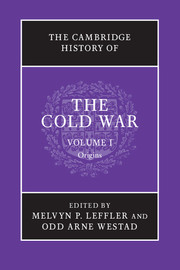Book contents
- Frontmatter
- 1 The Cold War and the international history of the twentieth century
- 2 Ideology and the origins of the Cold War, 1917–1962
- 3 The world economy and the Cold War in the middle of the twentieth century
- 4 The emergence of an American grand strategy, 1945–1952
- 5 The Soviet Union and the world, 1944–1953
- 6 Britain and the Cold War, 1945–1955
- 7 The division of Germany, 1945–1949
- 8 The Marshall Plan and the creation of the West
- 9 The Sovietization of Eastern Europe, 1944–1953
- 10 The Cold War in the Balkans, 1945–1956
- 11 The birth of the People’s Republic of China and the road to the Korean War
- 12 Japan, the United States, and the Cold War, 1945–1960
- 13 The Korean War
- 14 US national security policy from Eisenhower to Kennedy
- 15 Soviet foreign policy, 1953–1962
- 16 East Central Europe, 1953–1956
- 17 The Sino-Soviet alliance and the Cold War in Asia, 1954–1962
- 18 Nuclear weapons and the escalation of the Cold War, 1945–1962
- 19 Culture and the Cold War in Europe
- 20 Cold War mobilization and domestic politics: the United States
- 21 Cold War mobilisation and domestic politics: the Soviet Union
- 22 Decolonization, the global South, and the Cold War, 1919–1962
- 23 Oil, resources, and the Cold War, 1945–1962
- Bibliographical essay
- Index
- References
15 - Soviet foreign policy, 1953–1962
Published online by Cambridge University Press: 28 September 2010
- Frontmatter
- 1 The Cold War and the international history of the twentieth century
- 2 Ideology and the origins of the Cold War, 1917–1962
- 3 The world economy and the Cold War in the middle of the twentieth century
- 4 The emergence of an American grand strategy, 1945–1952
- 5 The Soviet Union and the world, 1944–1953
- 6 Britain and the Cold War, 1945–1955
- 7 The division of Germany, 1945–1949
- 8 The Marshall Plan and the creation of the West
- 9 The Sovietization of Eastern Europe, 1944–1953
- 10 The Cold War in the Balkans, 1945–1956
- 11 The birth of the People’s Republic of China and the road to the Korean War
- 12 Japan, the United States, and the Cold War, 1945–1960
- 13 The Korean War
- 14 US national security policy from Eisenhower to Kennedy
- 15 Soviet foreign policy, 1953–1962
- 16 East Central Europe, 1953–1956
- 17 The Sino-Soviet alliance and the Cold War in Asia, 1954–1962
- 18 Nuclear weapons and the escalation of the Cold War, 1945–1962
- 19 Culture and the Cold War in Europe
- 20 Cold War mobilization and domestic politics: the United States
- 21 Cold War mobilisation and domestic politics: the Soviet Union
- 22 Decolonization, the global South, and the Cold War, 1919–1962
- 23 Oil, resources, and the Cold War, 1945–1962
- Bibliographical essay
- Index
- References
Summary
The decade between the death of Iosif Stalin and the Cuban missile crisis was one of great promise and great peril. The promise consisted in the possibility of reversing the Cold War confrontation, the peril in its turning into real war. This chapter attempts to explain why the promise remained unfulfilled and why the peril, despite an initial turn toward détente, subsequently increased rather than diminished. Soviet foreign policy, to be sure, is only a part of the explanation, but it is an indispensable one. Rather than divert attention to other countries, the discussion that follows aims to assess the policy on its own merits. Benefiting from inside evidence that was not available at the time but is now, it will focus on what policymakers wanted to accomplish and what they actually did accomplish.
As Soviet leaders always proudly emphasized, their foreign policy was unlike any other, as was their state. The policy was unique in the extent to which their Marxist-Leninist beliefs determined their perception of why other states behaved the way they did. The unique feature of the Soviet state most relevant to foreign policy was the vast power wielded by the supreme leader, which made its exercise highly personalized. As the following discussion will show, the post-Stalin decade abounds in vivid, and sobering, examples of what a difference a man and a system could make to foreign policy.
A missed chance
Stalin’s legacy left a formidable challenge to his successors, none of whom could hope to fit into his oversized shoes. They inherited from him a sullen empire, which he had acquired by extending his power to Eastern Europe as the main safeguard of Soviet security as he understood it. His manner of doing so, however, had precipitated confrontation with the world’s most powerful nation, the United States, thus making the Soviet Union more insecure. As the Cold War became militarized, the buildup of nuclear weapons, whose supposed utility was but dimly understood, added to the challenge. Tantalizing fragments of evidence suggest that the despot’s timely demise may have saved not only most of his entourage but also much of the outside world from possible destruction because of the far-fetched military schemes he may have been entertaining in the twilight of his life.
- Type
- Chapter
- Information
- The Cambridge History of the Cold War , pp. 312 - 333Publisher: Cambridge University PressPrint publication year: 2010
References
- 7
- Cited by



